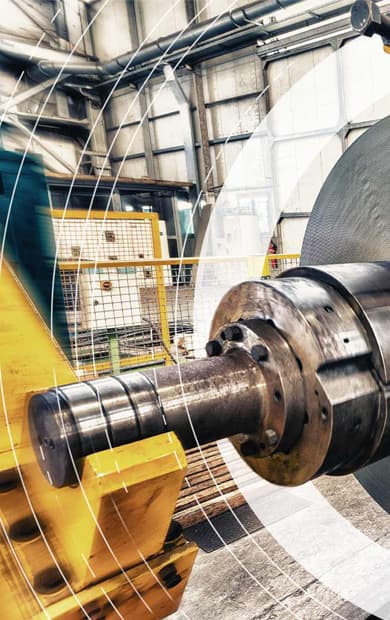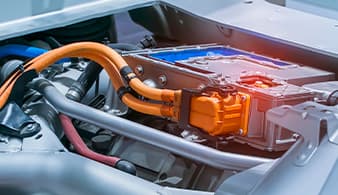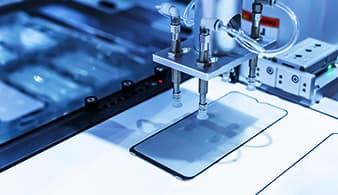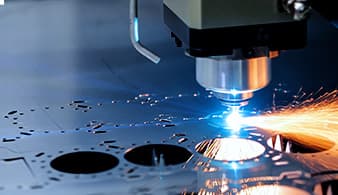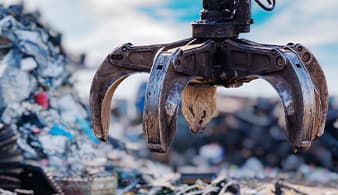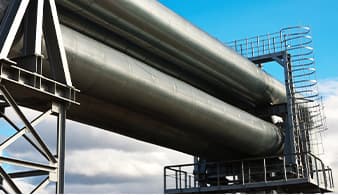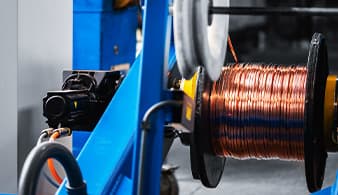Overview
Argus delivers trusted price data and market intelligence to help you understand the drivers behind primary and secondary metal markets. Our service differentiates with in-depth market commentary, analysis and news on ferrous and non-ferrous metals at the heart of commercial trade and industrial manufacturing.
The global metals supply chain uses Argus metals commodity data as a reference in physical supply and derivative contracts, for mark-to-market purposes, as a value indicator for tax assessments, for risk management, and in strategic analysis and planning.
Argus delivers four core products within its metals portfolio: Argus Steelmaking Raw Materials, Argus Non-Ferrous Markets, Argus Scrap Markets and Argus Battery Materials. Each offering includes access to Argus Metals – your definitive metals platform.
Metals market coverage
Argus is a leading independent provider of market intelligence to the global energy and commodity markets. Our price assessments and market intelligence are available for all major metals markets across the globe. Explore the coverage most relevant to your business:
Latest metals news
Browse the latest market moving news on the global metals industry.
Governments must protect Americas steel: ArcelorMittal
Governments must protect Americas steel: ArcelorMittal
Pittsburgh, 6 February (Argus) — Global steelmaker ArcelorMittal called for countries across the Americas to tighten steel import restrictions to protect their domestic industries. ArcelorMittal said countries like Brazil, Canada and Mexico needed to toughen trade restrictions in line with US and European counterparts. The US increased its Section 232 tariff on imported steel to 50pc and extended the scope of the duties to derivative products in June 2025. The EU implemented its Carbon Border Adjustment Mechanism (CBAM) on 1 January, imposing an additional tax on more carbon-intensive import products to ensure less carbon-intensive manufacturing on the continent is financially competitive. The EU also proposed a new steel safeguard quota which ArcelorMittal projected will combine with CBAM to reduce steel imports to Europe by 10mn t compared with 2024 levels. ArcelorMittal expected other governments to react to such a displacement with new trade restrictions of their own. The company noted that Brazil, Canada and Mexico are considering new import restrictions to protect their domestic steel industries, but that progress could accelerate. The hope for additional trade restrictions comes alongside various projects and returning capacity the company has planned across the Americas in 2026. ArcelorMittal expects 2026 profits to be supported by higher prices in North America in the aftermath of tightened imports, coinciding with increased contributions from its 1.5mn t/yr electric arc furnace at its Calvert, Alabama, mill as it ramps up through 2026. The mill started its first heat in June and expects to be fully operational by the end of 2026. But the company had no timelines on potential further expansions that were previously discussed. Brazilian steel prices could also rise in the second quarter if new import restrictions are implemented. ArcelorMittal was nearing completion of a 4.5mn t/yr direct-reduced iron pellet project in Serra Azul, with the first shipments coming in February, and began commissioning a 400,000 t/yr steel sections and bar mill in Barra Mansa. ArcelorMittal's Mexican operations, which collectively produce 1mn t/yr of long steel and 2.8mn t/yr of flat steel, are back on line after suffering outages in the fourth quarter. The long steel operations were back at the end of January, so it will only contribute for two months of the first quarter, while the flat steel production will contribute for the full quarter. By Aaron May Send comments and request more information at feedback@argusmedia.com Copyright © 2026. Argus Media group . All rights reserved.
Q&A: GravitHy expects policy clarity to shape economics
Q&A: GravitHy expects policy clarity to shape economics
London, 6 February (Argus) — Argus spoke with French direct-reduced iron (DRI) firm GravitHy's chief executive Jose Naldin to explore the company's strategy, cost position and partnership plans in a rapidly shifting competitive landscape. The company is progressing with its Fos-sur-Mer plant, scheduled to begin production in 2030. Edited highlights follow: Some other green steel companies will start with natural gas and gradually introduce H2, mostly because of the price of hydrogen. Does GravitHy plan to use green H2 from the start or have a similar strategy to others? We follow a different approach. While other projects adopt gradual strategies, we are fully committed to energy independence and decarbonisation, and we believe the technology for hydrogen production and its use in DRI is already mature. Our strategy is to start with hydrogen from day one. A key advantage of our site in France is access to baseload electricity, allowing us to produce and use hydrogen on site, which is more cost effective and technically sound. We will still use some natural gas to add carbon to the product, but only for carburisation, and hydrogen will be the reducing agent from the start. This is why we will install significant electrolyser capacity. GravitHy's competitiveness depends heavily on electricity and hydrogen prices in the EU. Which EU policy tools and trade measures support your cost position most? DRI/HBI production has two main costs: energy and cost of capital. Iron ore is a global commodity, so electricity becomes the differentiator. This is why choosing France, with its competitive and decarbonised nuclear-based mix, is essential. But competitiveness also requires a level playing field. Without strong policies ensuring others follow the same decarbonisation rules, European producers are at a disadvantage. Europe must remain committed to the Green Deal and Fit for 55 because decarbonisation is not only about climate, but also about industrial resilience, sovereignty and security. The fundamentals are set out in the Clean Industrial Deal and the Steel and Metals Action Plan. What matters now is implementation. We are waiting for the Industrial Accelerator Act to detail lead market mechanisms and define green steel in a way that incentivises resilient European value chains. North Africa, particularly Algeria, is rapidly scaling low-carbon DRI. Given this growing supply of low cost, hydrogen-ready DRI/HBI in nearby markets, how does GravitHy position itself competitively while producing in a higher cost environment? Competitiveness must be analysed globally and this is where policies matter. Imported material must face the same carbon costs, and safety and quality criteria. Projects outside Europe also face rising cost of capital and natural gas prices. When you add these factors together — plus CBAM payments, transport costs and a strengthened ETS — our projections show that early in the next decade, GravitHy can be competitive against natural gas-based HBI imports. There is confusion because people compare today's HBI prices with future costs for new projects. But the market will change: free allowances will phase out, CBAM becomes financially relevant and carbon prices will likely rise. Under these conditions, our modelling shows competitiveness around 2030. But this depends on EU policy implementation — especially the Industrial Accelerator Act and a strong ETS — to maintain clear decarbonisation incentives. Your current schedule targets commercial production in 2030, with testing beginning in 2029. Is this timeline still valid, given delays at other European decarbonisation projects? For now, yes. As engineering and procurement advance, we will confirm the dates. The timeline depends on permitting and reaching an investment decision, but it remains ambitious and achievable. It will also depend on the progress of our engineering studies and procurement strategy. Europe faces tightness in DR-grade pellet supply. Has GravitHy secured long-term pellets, and how exposed are you to fluctuations? We have already signed a contract with Rio Tinto, one of our shareholders, for high grade pellets covering part of our needs. We are in discussions with other pellet suppliers to complete our strategy. Globally, there is existing pellet capacity and numerous new projects. If all materialise, there could be tightness, but this is a bottom-up situation. For the first wave of DRI projects, supply is sufficient. And if DRI capacity expands significantly, pellet producers will react as it is an attractive market. Mining companies are flexible and investment driven. So I am less concerned than many. Our aim is long-term partnerships across all inputs and we believe our project's value strengthens this position. GravitHy has recently signed an agreement with Marcegaglia, which aligns with Marcegaglia's plan to start electric arc furnace-based flat steel production in Fos around 2028. What does this co-operation entail? Potential supply agreement or infrastructure sharing? These projects are still in development, so the goal is to build strong value chains early. Collaboration is much easier at this stage than after plants are built. GravitHy, Marcegaglia and Nucor are in the same area and there are many potential synergies: logistics, infrastructure, circular economy streams, resource use and environmental co-ordination. If you collaborate too late in heavy industry, it becomes difficult or impossible because of cost and technical constraints. The MoU is not a commercial negotiation, it is about exploring how to make development faster, more efficient, safer and more cost effective through collaboration. Are you exploring partnerships with northern European electric arc furnace/mini-mill projects? No. We remain a small but growing team focused on maximising our project in Fos. We look at northern Europe mainly to understand how we can support their decarbonisation by supplying the iron units they need, rather than forming MoUs similar to the one with Marcegaglia and Nucor. There is only so much we can do with our current size; the focus is on maximising the project in Fos. By Elif Eyuboglu Send comments and request more information at feedback@argusmedia.com Copyright © 2026. Argus Media group . All rights reserved.
US HRC buyers eye imports amid high prices
US HRC buyers eye imports amid high prices
Pittsburgh, 6 February (Argus) — US hot-rolled coil (HRC) buyers are increasingly turning to imports as they face elevated domestic prices and long lead times driven by a tight supply environment. US president Donald Trump in March 2025 imposed 25pc global steel import tariffs, which doubled to 50pc in June. The tariffs effectively shut out much of the world's steel, leading import volumes to fall precipitously. US steel buyers before the tariffs had relied on imports as a hedge against domestic price increases, with supplies from Canada and Mexico comparable in price and lead times to the Midwest and southern US. HRC imports totaled 1.11mn t in January-November 2025, 42pc lower than the same period in 2024, according to the latest data from the US Census Bureau. Since the imposition of the tariffs, US mills have increased spot prices steadily, especially in recent months as mills focused on increased contract supply commitments to start 2026. That contract supply increase has come at the expense of spot availability, to the point where some mills are stretched thin for the first months of the year. The Argus US HRC spot price rose to $964.25/short ton during the week ended 30 January, up from $910/st during the week ended 2 January. US mills short on spot HRC Less HRC production is being committed to spot availability even as US operating rates rise. The monthly operating rate for all steel production averaged 76pc in January 2026, according to American Iron and Steel Institute data. That was up slightly from the 74pc average a year earlier, but buyers said less of the current operating rate was committed to HRC spot supply because of mills' pivot to larger contracual commitments. The HRC spot market became so tight in January that just a handful of minor outages and backlogs exacerbated the poor availability. Some mills turned buyers away in the aftermath of the shortages. US HRC lead times grew to 6.4 weeks in the week ending 30 January, up from 5.4 weeks for the week ending 2 January, according to Argus data. Those lead times reflected transactions from mills that could participate in the spot market, while other mills that could not participate told buyers in January that they would not have spot availability until the end of the first quarter at the earliest. Eventually, US mills set a price floor of $950/st to even begin spot HRC discussions during the week ending 23 January, even though average prices were still below that level at the time. Buyers evaluated import availability in January as an alternative to rising domestic lead times and prices, but overseas mills and US importers had few satisfactory options. Import momentum remains slow US buyers are slowly turning back to the import market as foreign prices and lead times begin to compare more favorably to domestic supply, but issues remain. January offers for HRC imports from regions such as southeast Asia and Turkey were as much as $100/st lower than US domestic price levels in recent weeks. Buyers could not get the cheaper imports quickly, though, with delivery for late January offers timed for the middle of the second quarter. Such long delivery times were previously disqualifying because buyers could not be sure imported supply would still be competitive with domestic prices when trying to anticipate the market months in advance. But with US mills now quoting months-long lead times as well, import considerations have transformed from a gamble on beating the market to a simple issue of maintaining reliable inventory from as many sources as possible. Some US mills also continue to push domestic prices high enough that buyers are confident imported supply will still be cheaper when it arrives months from now. By Aaron May Send comments and request more information at feedback@argusmedia.com Copyright © 2026. Argus Media group . All rights reserved.
Australia’s Pilbara shuts LNG, iron ore ports on storm
Australia’s Pilbara shuts LNG, iron ore ports on storm
Sydney, 6 February (Argus) — Australian port authority Pilbara Ports will clear all berths at the Ports of Ashburton, Cape Preston West, Dampier, and Varanus Island by 4pm local time (8am GMT) on 6 February, while Port Hedland will be closed by 9.30pm local time, it said today. Pilbara Ports will move ships out of the ports, which handle LNG and iron ore exports, because of the fast-developing Tropical Low 21U storm, it added. The port authority moved the export hubs into Cyclone Alert 2 earlier this week, market participants told Argus on 5 February. Tropical Low 21U is currently hovering off the coast of Western Australia's (WA) Kimberley region, according to the Australian Bureau of Meteorology (BoM). It is likely to develop into a cyclone by 8am local time on 7 February, as it moves south towards WA's iron ore-rich Pilbara region, BoM forecasts show. The weather system may pass close to Dampier early on 8 February. Producers shipped 1.4mn t of LNG out of Dampier port in December, down by 12pc on the year, and 15mn t of iron ore , up by 9pc on the year. Pilbara Ports' other export hubs handled 52mn t of iron ore in December. WA ports have faced weather disruptions before. Four cyclones lashed Pilbara in January-February 2025, pushing down producer BHP and Rio Tinto's WA iron ore sales in the first quarter of 2025. Cyclone Sean flooded a railcar dumper at Rio Tinto's East Intercourse Island (EEI) facility at Dampier on 20 January 2025, halting loadings at the site until early March. But Rio Tinto continued to move ore out of other WA facilities over that period. By Avinash Govind Send comments and request more information at feedback@argusmedia.com Copyright © 2026. Argus Media group . All rights reserved.
Spotlight content
Browse the latest thought leadership produced by our global team of experts.
Explore our metals products
Limit your price risk exposure with daily metals market intelligence, empower your business with data-rich industry tools and inform your long-term strategy with outlooks backed by over 50 years of commodity reporting.
Key price assessments
Argus prices are recognised by the market as trusted and reliable indicators of the real market value. Explore some of our most widely used and relevant price assessments.


